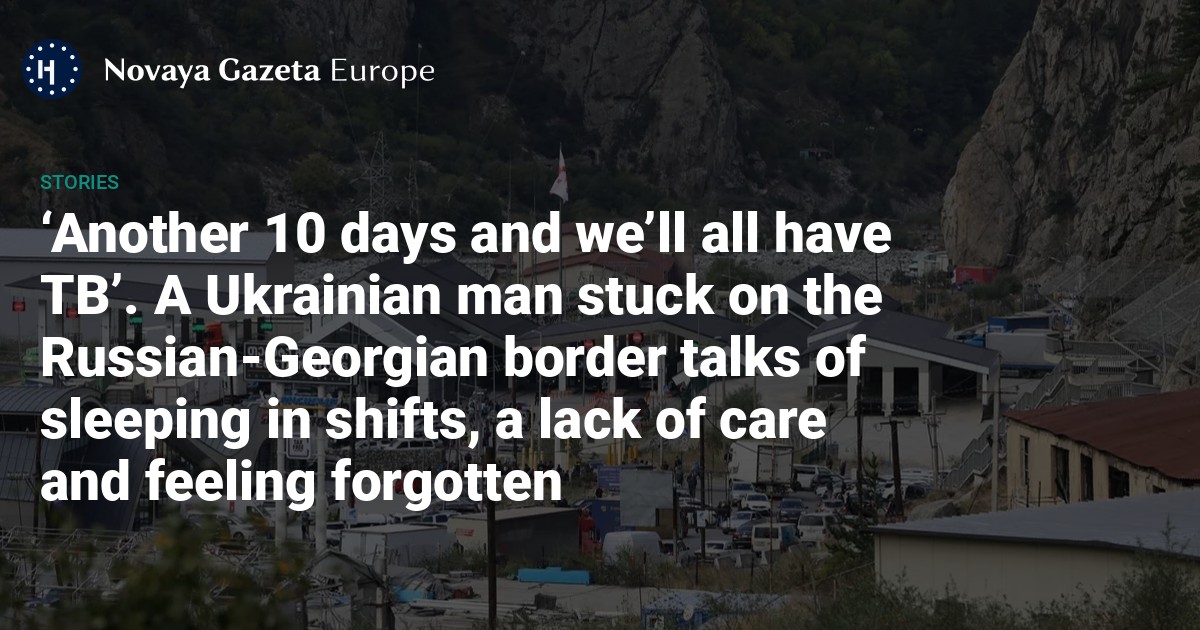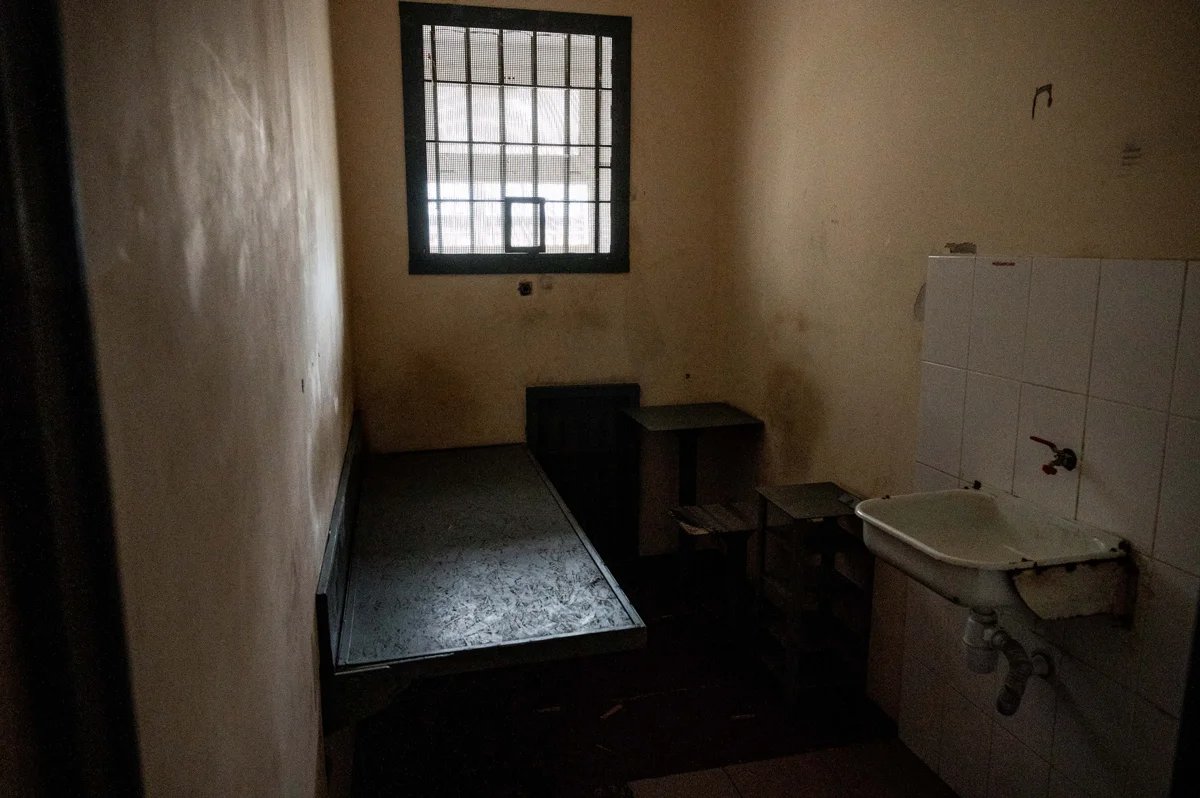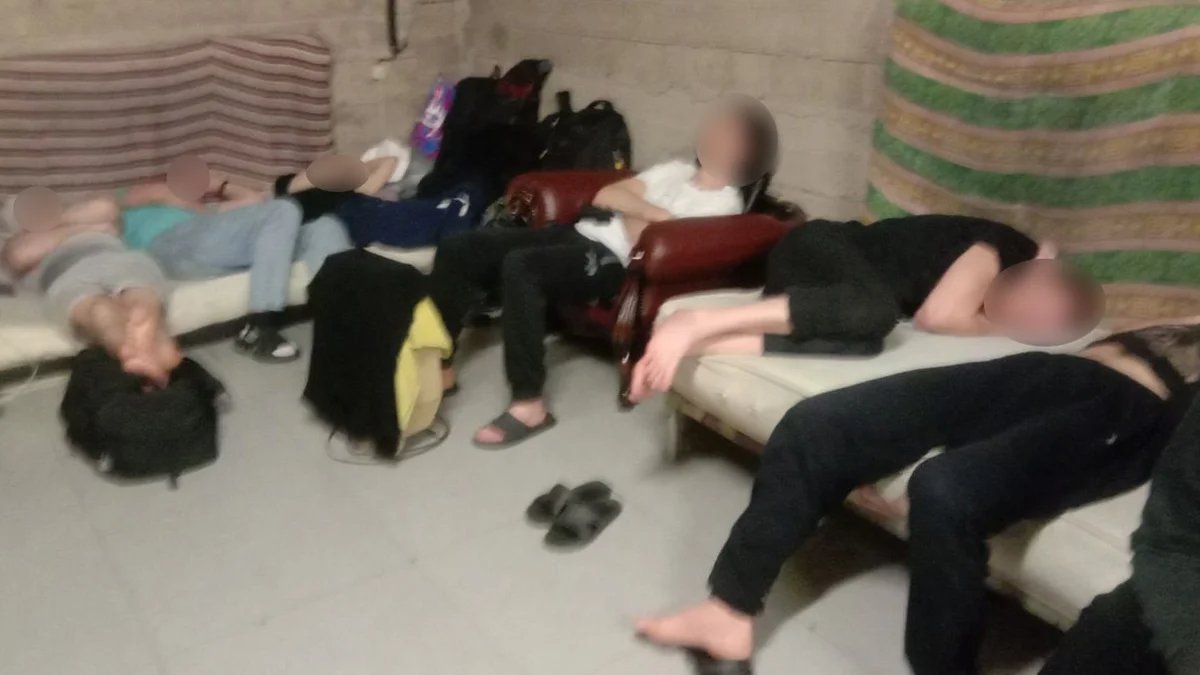



Dozens of Ukrainians have been living in an underground room without windows or ventilation on the border between Russia and Georgia for over a week. Some are former prisoners who were forcibly removed from occupied parts of Ukraine early in the war, while others are ordinary citizens barred from entering Russia and with nowhere else to go.
One of the Ukrainians in the basement told Novaya Europe about the conditions they are living in, with 56 people sharing a room with 17 beds.
The Ukrainians have ended up in a cold cellar on the Georgian side of the border after crossing the Russian border checkpoint at Verkhny Lars, having been dropped off there from Russian temporary detention centres.
Once they cross the border, they are left in a basement while Ukrainian authorities seek to corroborate their identity.
The current group consists of former prisoners and ordinary citizens deported from occupied areas of Ukraine. They do not have ID papers and have been denied entry back into Russia. Once they cross the border, they are left in a basement while Ukrainian authorities seek to corroborate their identity. The process can take weeks or even months.
Petro (not his real name) has been in the basement since 18 June. He told Novaya Europe that there were 56 people living there in all. Volunteers have given journalists the same figure as of 24 June. At least nine more are expected to arrive at the border in the coming days.
“I arrived on my birthday. It was a joint gift from the Ukrainian, Georgian and Russian authorities. Some people have been here for almost four weeks,” Petro said.

A prison cell used by Russian security forces during its occupation of Kherson, Ukraine, 22 May 2023. Photo: Michael Brochstein / Sipa USA / Vida Press
Before being delivered to the border, Petro had served almost 11-and-a-half years in prison. First he served his sentence in central Ukraine, but then he contracted tuberculosis and was transferred to a hospital in the city of Kherson, which was captured by Russian troops shortly after the invasion of Ukraine for several months in 2022.
“When the occupiers came, there was no food in the prison. People began to go hungry. There were three months where we were totally cut off. In June, the Kherson region prison administration came in wearing masks and began beating all the prisoners up, shouting ‘We’ll show you for all the blood that’s been spilt’. There were about 540 of us, and we were all beaten up for half the day, from eight in the morning until noon. They decided to take it out on us, because for the Russians we were nobody, and they were in charge,” Petro continued.
There are no blankets or pillows. The lucky ones are given a mattress.
Petro was transported to the southern Russian Volgograd region to serve out his sentence in November 2022, as the Armed Forces of Ukraine were about to liberate the city. From there, he was taken to the border with Georgia earlier this month. He contacted Novaya Europe hoping to highlight the conditions he found himself in. He described the basement as a room of about 60 square metres, divided up into three areas. There are no windows and there is no ventilation. To make matters worse, almost everyone there smokes.
“We sleep on the floor however we can. There are beds for 17 people. We sleep in shifts,” Petro explains.
There are no blankets or pillows. The lucky ones are given a mattress. By six in the evening, there are three men asleep on each of them. The rest try to make themselves comfortable in chairs or on the floor. Petro says he sometimes manages six hours of sleep, but between two and four is more typical. As he pans around to show me the basement, he keeps repeating off camera: “So this is the Europe you talk about! The European Georgians don’t care. They don’t even feed us.”
The only amenities in the basement are a toilet and a washbasin. There is no shower. What there is in the basement has been installed by volunteers and the deportees themselves. The Georgian authorities did not have the space in mind as a waiting room and didn’t fit it out accordingly. Some of the people living in cramped, damp rooms without daylight or fresh air have acute tuberculosis or are HIV+. Two people, Petro says, “can’t walk at all”. He also said that they are not allowed to go outside.
The only food they have access to is provided by volunteers.
“They won’t let us go anywhere. We’re in the mountains. It should be all fresh air and beauty. … I’ve already been here six days. Another 10 days of damp, poor nutrition and a lack of fresh air, and we’ll all have TB. There’s no medication either,” he complains.
Petro added that although there was a store close by, the only things available were cigarettes, tea and coffee, and it only accepted cash. He said the shop staff refused to sell food to people from the basement. The only food they have access to is provided by volunteers. Activists are currently collecting donations to provide them with the essentials.

The Ukrainians stuck on the Georgian border. Photo courtesy of Petro
Petro hopes to be out of the basement as soon as possible. His fiancée is waiting for him in Poland, where she went for treatment after suffering an injury early in the war.
“I don’t want to go back to Ukraine. But I don’t know what to do. I can’t get to Poland without a passport. I don’t want to stay in Georgia either. I want to go to Europe,” Petro concludes.
Maria Belkina, head of the volunteer organisation Volunteers Tbilisi which helps the Ukrainians stuck at the border, told Novaya Gazeta Europe that the situation may have spun out of control due to changes in Georgia’s migration policy proposed in April 2025.
The Ukrainians are also barred from re-entering Russia and end up in legal limbo.
According to Belkina, since 2022 there had been an unspoken agreement that Ukrainians could enter Georgia with internal passports not intended for international travel, because it was understood that “there is a war and people need help”. However, the Georgian authorities now want to prevent people from entering the country without the correct passport, which, she added, causes a “completely idiotic situation”, as the Ukrainians are also barred from re-entering Russia and end up in legal limbo.
“People find themselves between the two borders with no way to get anywhere. It can’t be left like that,” she said.
The Russian government has banned independent media. We were forced to leave our country in order to keep doing our job, telling our readers about what is going on Russia, Ukraine and Europe.
We will continue fighting against warfare and dictatorship. We believe that freedom of speech is the most efficient antidote against tyranny. Support us financially to help us fight for peace and freedom.
By clicking the Support button, you agree to the processing of your personal data.
To cancel a regular donation, please write to [email protected]
VPNovaya
Help Russians and Belarusians Access the Truth
